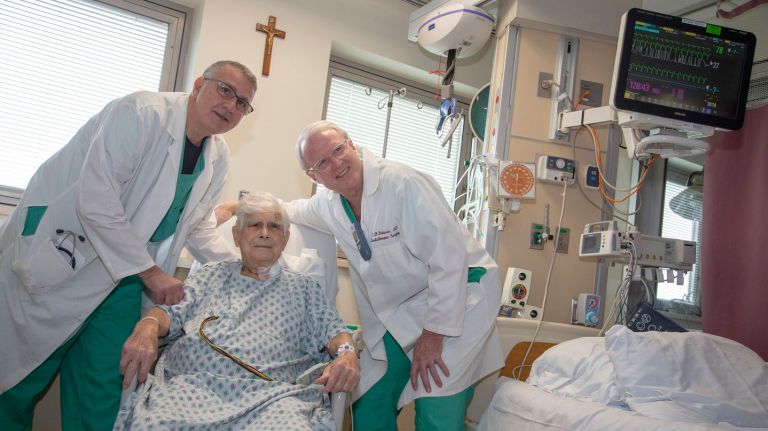
Pittsburgh (us) — heart surgery to repair the mitral valve is safe and leads to a better quality of life for older patients previously. Bleeding during or after the surgery blood clots that can cause heart attack, stroke, or lung problems infection pneumonia pancreatitis breathing problems

16 even in the absence of overt cardiovascular disease, nonagenarians have smaller lv cavities, more concentric left ventricular remodeling and hypertrophy, diastolic dysfunction, and mitral annular calcification.
Heart valve surgery risks elderly. More than 20% of heart valve surgical patients are over 75 years of age. Significant preoperative risk factors for early mortality include poor left ventricular function and preoperative pacemaker insertion. 3/8/2021 4 tavr risks transcatheter aortic valve replacement (tavr) carries a risk of complications, which may include:
Ciuffo now offers a surgery that can be performed on patients that would normally be too frail for the procedure. Dysfunction of these valves prevents proper blood flow through the heart. However, left untreated, advanced valve disease can cause heart failure, stroke, blood clots or death due to.
However, data suggest that old age is associated with increased morbidity and mortality following cardiac surgery. They are at higher risk of sleep disturbance due to medications, pain and a change in environment, which in turn can contribute to delirium, a type of confusion after surgery. These structural changes become more severe in response to chronic.
Pittsburgh (us) — heart surgery to repair the mitral valve is safe and leads to a better quality of life for older patients previously. What are the risks of heart valve repair or replacement surgery? Severe heart valve diseases are not uncommon in the elderly and often treatment may be challenging due to high risks related both to relevant comorbidities and the frailty condition of elderly patients.
In general, the older patient will have a longer recovery time than a younger patient and is expected to have more complications. Brazilian journal of cardiovascular surgery carrascal y, et al. Possible risks of heart valve repair or replacement surgery include:
This study further shows that isolated avr can be done with low operative mortality and that the performance of concomitant surgical procedures exposes elderly patients to. Childhood cancer survivors who had radiation therapy to the chest also have an increased prevalence of heart valve disease later in life. In addition, the additive risks in the elderly of valve replacement surgery at the time of bypass are unknown.
Valve disease and health risks. Valve replacement and heart bypass surgery (or a combination of the two) are the most common procedures in the “elderly.” fact: However, with new advances in heart surgery, dr.
Minimally invasive heart valve surgery is a type of surgery performed through smaller incisions. Aortic valve replacement is the procedure of choice for elderly patients with aortic valve disease. Heart valve diseases in the elderly are often associated with a consistent number of extracardiac comorbidities, mainly related to atherosclerosis.
The last generation may have. Although surgery is still the first choice for most conditions, interventional strategies are emerging as a valid alternative both in high and intermediate risk. Our definition of “elderly” has evolved over the last 25 years.
In 2006, adam founded heartvalvesurgery.com to educate and empower patients. Aortic valve replacement in the elderly can be performed with acceptable mortality. For a valve repair, the procedure performed will depend on the type of valve problem that exists, like separation of fused valve leaflets, repair of torn leaflets, and/or the reshaping of valve parts to ensure better function.
A modern technique for replacing heart valves without major surgery is safe even for very elderly patients, researchers say. This unidirectional flow of blood is regulated by four valves present in the human heart: From the upper chambers (atria) to the lower chambers (ventricles) and then out of the heart.
The number of patients aged 70 and older requiring avr continues to increase. 16 even in the absence of overt cardiovascular disease, nonagenarians have smaller lv cavities, more concentric left ventricular remodeling and hypertrophy, diastolic dysfunction, and mitral annular calcification. When the heart has stopped, the doctor will perform the procedure by removing the diseased valve and putting in the artificial valve, in the case of a valve replacement.
Adam pick is a heart valve patient and author of the patient�s guide to heart valve surgery. Many people live long and healthy lives and never realize they have a mild valve problem. More than 30% of the patients having heart valve surgery are over 70.
This type of surgery reduces blood loss, trauma , and length of hospital stay. These results show that avr can be performed with acceptable operative risks in the elderly. Blood flows through the heart in a single direction:
Preoperative characteristics of patients under heart valve surgery. Adam has been featured by the american heart association and medical news today. Bleeding during or after the surgery blood clots that can cause heart attack, stroke, or lung problems infection pneumonia pancreatitis breathing problems
Risk factor n=939 (%) qualitative preoperative female gender 407 (43.3) smoking 257 (27.4) hypertension 605 (64.4) Over the past 2 decades, improvements in myocardial protection, extracorporeal circulation, anesthesia, and surgical techniques have significantly reduced the morbidity and mortality associated with cardiac surgery. Your surgeon will review your diagnostic tests prior to your surgery to determine if you are a candidate for minimally invasive valve surgery.
Heart valve disease in the elderly.